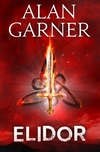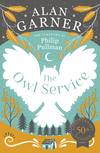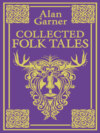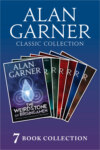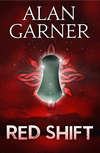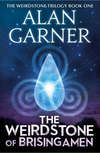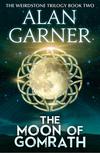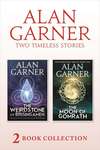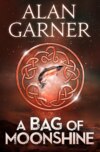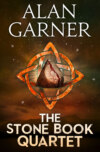Loe raamatut: «Elidor»

Illustrated by Charles Keeping

For J. H.
“Childe Rowland to the Dark Tower came”
King Lear act iii, sc 4
CONTENTS
Cover
Title Page
Dedication
Epigraph
Why You’ll Love This Book
1. Thursday’s Child
2. Cloth of Gold
3. Dead Loss
4. Malebron
5. The Mound of Vandwy
6. The Lay of the Starved Fool
7. Corporation Property
8. The Deep End
9. Stat
10. Choke
11. The Last Spadeful
12. The Letterbox
13. “Silent Night”
14. The High Places
15. Planchette
16. The Fix
17. Spear-Edge and Shield-Rim
18. Paddy
19. The Wasteland
20. The Song of Findhorn
About the Author
Also by the Author
Copyright
About the Publisher
Why You’ll Love This Book
By Jonathan Stroud
How old was I? About ten. I took an Alan Garner book (it was The Weirdstone of Brisingamen), flopped into a chair and opened it up. And that was that. The Sunday afternoon grew old; my family moved about me, talking loudly, making the tea, calling questions in my ear – their sounds were muted, far away. Alan Garner’s magic had me captured: I sat like a stone in the midst of all the humdrum bustle of the house, walking with wizards, gazing on sleeping kings. The fantastic and the ordinary were overlaid upon each other – and I was trapped between the two.
In all Alan Garner’s work the mythic and the mundane collide, and Elidor is no exception. Odd things happen in everyday places and to everyday things, and the results are strange and sinister: an eye stares in through a letterbox – but the porch beyond is empty; the shadows of two men (who are not present) are seen in a suburban garden – hanging vertically in mid-air; all the electrical equipment in a house starts by itself, and continues to buzz and whirr even with the plugs pulled out… The characters in the story who experience these events find themselves just as trapped as I was in my reading, but they cannot close the book and set it down.
How does it all begin? Four children in mid-Twentieth Century Manchester find a doorway to another world. You might expect (having read other stories with such doors) that this is the beginning of a quest in which the other world is thoroughly explored, evil defeated and the heroes return home triumphant.
But it doesn’t work that way.
The land of Elidor is dying, almost dead. It is an empty, unpopulated waste and the children spend very little time there before returning home with four treasures that might one day help Elidor be reborn. And from that instant the power of those treasures and the threat of the enemies who seek to break through after them turn the family’s cottage into a border between worlds, and the pleasant adventure the reader might have anticipated becomes something much more desperate and defensive.
All borders are no-man’s-lands, where the known and unknown meet, safety and danger overlap, and meanings shift and blur. They are populated by fools, vagrants, tricksters and the tricked. And now, thanks to the children’s actions, their house is such a gate. The front door opens on to their street and on to a wilderness in Elidor – and it does so at one and the same time. And something nasty is seeking to get through…
How old am I now? Late thirties. And when I read Elidor again I realise that the wizardry that captured me a quarter of a century ago still holds me tight. Like all writers of my generation, I owe Alan Garner an unpayable debt. Novels like Elidor are themselves a boundary, set like standing stones between earlier tales of movement between worlds and recent books (so common now) that mingle magic with the day-to-day. But Elidor is more rigorous and less complacent than anything that came before or after. It brings the logic of myth to bear upon modern children’s fiction and does so without a shred of sentimentality. After forty years it is knife-sharp still, and not a word is wasted. It thrums with a wild, harsh beauty and a power that most fantasies can only dream of. Read on, and let it transfix you too.
Jonathan Stroud
Jonathan Stroud is the author of the world acclaimed Bartimaeus Trilogy. The three titles of the trilogy, published between 2003 and 2005, have been on the Bestseller lists in the UK, US, Japan and Germany. Formerly a children’s book editor, Jonathan has also written three previous novels for young adults. He lives in St Albans with his wife, a children’s book designer and illustrator, and their two young children.
CHAPTER 1
THURSDAY’S CHILD
“All right,” said Nicholas. “You’re fed up. So am I. But we’re better off here than at home.”
“It wouldn’t be as cold as this,” said David.
“That’s what you say. Remember how it was last time we moved? Newspapers on the floor, and everyone sitting on packing cases. No thanks!”
“We’re spent up,” said David. “There isn’t even enough for a cup of tea. So what are we going to do?”
“I don’t know. Think of something.”
They sat on the bench behind the statue of Watt. The sculptor had given him a stern face, but the pigeons had made him look as though he was just very sick of Manchester.
“We could go and ride one of the lifts in Lewis’s again,” said Helen.
“I’ve had enough of that,” said Nicholas. “And anyway, they were watching us: we’d be chucked off.”
“What about the escalators?”
“They’re no fun in this crowd.”
“Then let’s go home,” said David. “Hey, Roland, have you finished driving that map?”
Roland stood a few yards away, turning the handles of a street map. It was a tall machine of squares and wheels and lighted panels.
“It’s smashing,” he said. “Come and look. See this roller? It’s the street index: each one has its own letter and number. You can find any street in Manchester. It’s easy. Watch.”
Roland spun a wheel at the side of the map, and the index whirled round, a blur under the glass.
“There must be some pretty smooth gears inside,” said Nicholas.
The blur began to flicker as the revolving drum lost speed. Roland pressed his finger on the glass.
“We’ll find the one I’m pointing at when it stops,” he said.
The drum turned slowly, and the names ticked by: and the drum stopped.
“Thursday Street,” said Helen. “Mind your finger. ‘Ten, seven L’.”
“Ten will be the postal district,” said Roland. “You turn the map wheel until number seven is level with these squares painted red on the glass, and then Thursday Street is in square L. There.”
“I can’t see it,” said Nicholas.
The map square was full of small roads, some too short to hold the name even when it was abbreviated. But at last the children found a ‘Th. S.’ jumbled among the letters.
“Titchy, isn’t it?” said David.
“It’s such a funny name,” said Roland. “Thursday Street. Shall we go and see what it’s like?”
“What?”
“It’s not far. We’re in Piccadilly here, and Thursday Street’s off to the right up Oldham Road. It shouldn’t be hard to find.”
“I might have known you’d think of something daft,” said Nicholas.
“But let’s do it,” said Helen. “Please, Nick. You and David’ll only start scrapping if we don’t. And when we’ve found it we’ll go home: then nobody’s bossed about.”
“OK,” said David. “That’s all right by me.”
“It’s still daft,” said Nicholas.
“Can you think of anything?”
“Oh, all right. This is your idea, Roland, so you take us. Can you find the way?”
“I think so. We’ll go up Oldham Road for a bit, and then cut through the back streets.”
They left Watt. David and Nicholas were better tempered now that there was something positive to be done.

“This is the turning we want,” said Roland after a while. “Down this next alley.”
“Mm,” said Nicholas. “It looks a bit niffy to me.”
The children had never been in the streets behind the shops. The change was abrupt.
“Phew!” said Helen. “All those fancy windows and posh carpets at the front, and it’s a rubbish dump at the back!”
They were in an alley that ran between loading bays and store-houses lit by unshaded bulbs: the kerb was low and had a metal edge, and there was the smell of boxwood and rotten fruit. Fans pumped hot, stale air into the children’s faces through vents that were hung with feathers of dirt.
Beyond the alley they came to a warren of grimy streets, where old women stood in the doorways, wearing sacks for aprons, and men in carpet slippers sat on the steps. Dogs nosed among crumpled paper in the gutter; a rusty bicycle wheel lay on the cobbles. A group of boys at the corner talked to a girl whose hair was rolled in brightly coloured plastic curlers.
“I don’t like this, Nick,” said Helen. “Should we go back up the alley?”
“No. They’ll think we’re scared. Look as though we know where we’re going – taking a short cut; something like that.”
As the children walked past, all the eyes in the street watched them, without interest or hostility, but the children felt very uncomfortable, and walked close together. The girl on the corner laughed, but it could have been at something one of the boys had said.
They went on through the streets.
“Perhaps it’s not a good idea,” said Roland. “Shall we go home?”
“Are you lost?” said Nicholas.
“No, but—”
“Now what’s all this?” said David.
Ahead of them the streets continued, but the houses were empty, and broken.
“That’s queer,” said Nicholas. “Come on: it looks as though Roland has something after all.”
“Let’s go back,” said Roland.
“What, just when it’s starting to be interesting? And isn’t this the way to your Thursday Street?”
“Well – sort of – yes – I think so.”
“Come on, then.”
It was not one or two houses that were empty, but row after row and street after street. Grass grew in the cobbles everywhere, and in the cracks of the pavement. Doors hung awry. Nearly all the windows were boarded up, or jagged with glass. Only at a few were there any curtains, and these twitched as the children approached. But they saw nobody.
“Isn’t it spooky?” said David. “You feel as if you ought to whisper. What if there was no one anywhere – even when we got back to Piccadilly?”
Helen looked through a window in one of the houses.
“This room’s full of old dustbins!” she said.
“What’s that chalked on the door?”
“Leave post at Number Four.”
“Number Four’s empty, too.”
“I shouldn’t like to be here at night, would you?” said Helen.
“I keep feeling we’re being watched,” said Roland.
“It’s not surprising,” said David, “with all these windows.”
“I’ve felt it ever since we were at the map in Piccadilly,” said Roland, “and all the way up Oldham Road.”
“Oh, come off it, Roland,” said Nicholas. “You’re always imagining things.”
“Look there,” said David. “They’ve started to bash the houses down. I wonder if we’ll see a demolition gang working. They do it with a big iron ball, you know. They swing it from a crane.”
Something had certainly hit the street they were in now, for only the fronts of the houses were standing, and the sky showed on the inside of windows, and staircases led up a patchwork gable end of wallpaper.
At the bottom of the row the children stopped. The streets continued, with cobbles and pavements and lamp posts – but there were no houses, just fields of rubble.
“Where’s your Thursday Street now?” said Nicholas.
“There,” said David.
He pointed to a salvaged nameplate that was balanced on a brickheap. “Thursday Street.”
“You brought us straight here, anyway, Roland,” said Nicholas. “The whole place has been flattened. It makes you think, doesn’t it?”
“There’s a demolition gang!” said Helen.
Alone and black in the middle of the wasteland stood a church. It was a plain Victorian building, with buttresses and lancet windows, a steep roof, but no spire. And beside it were a mechanical excavator and a lorry.
“I can’t see anybody,” said Roland.
“They’ll be inside,” said Nicholas. “Let’s go and ask if we can watch.”
The children set off along what had been Thursday Street. But as they reached the church even Nicholas found it hard to keep up his enthusiasm, for there was neither sound nor movement anywhere.
“We’d hear them if they were working, Nick. They’ve gone home.”
David turned the iron handle on the door, and pushed. The church clanged as he rattled the heavy latch, but the door seemed to be locked.
“They wouldn’t leave all this gear lying around,” said Nicholas. “They may be having a tea-break or something.”
“The lorry’s engine’s still warm,” said Roland. “And there’s a jacket in the cab.”
“The tailboard’s down, too. They’ve not finished loading all this wood yet.”
“What is it?”
“Smashed up bits of pew and floorboards.”
“Let’s wait, then,” said Nicholas. “Is there anything else?”
“No – yes, there is. There’s a ball behind the front wheel.”
“Fetch it out, and we’ll have a game.”
Roland pulled a white plastic football from under the lorry, and then he stopped.
“What’s the matter?”
“Listen,” said Roland. “Where’s the music coming from?”
“What music? You’re hearing things.”
“No, listen, Nick. He’s right.”
A fiddle was being played. The notes were thin, and pitched high in a tune of sadness. Away from the children an old man stood alone on the corner of a street, under a broken lamp post. He was poorly dressed, and wore a crumpled hat.
“Why’s he playing here?”
“Perhaps he’s blind,” said Helen. “Hadn’t we better tell him where he is? He probably thinks there are houses all round him.”

“Blind people know things like that by echoes,” said David. “Leave him alone: he may be practising. Oh, hurry up, Roland! We’re waiting!”
Roland let go of the ball, and kicked it as it fell.
He was about twenty yards from the others, and he punted the ball to reach them on the first bounce: but instead it soared straight from his foot, up and over their heads so quickly that they could hardly follow it. And the ball was still gaining speed, and rising, when it crashed through the middle lancet of the west window of the church.
David whistled. “Bullseye, Roland! Do it again!”
“Shh!” said Helen.
“It doesn’t matter. They’re pulling the place down, aren’t they?”
“I didn’t kick it very hard,” said Roland.
“Not much!”
“Never mind,” said Helen, “I’ll go and see if I can climb in.”
“We’ll all go,” said David.
“No. Stay here in case the gang comes back,” said Helen, and she disappeared round the corner of the church.
“Trust you to break a window,” said Nicholas.
“I’m sorry, Nick: I didn’t mean to. I just kicked the ball, and it seemed to fly by itself.”
“It flew by itself,” said Nicholas. “Here we go again!”
“But it did!” said Roland. “When I kicked the ball, the – the fiddle seemed to stick on a note. Didn’t you hear it? It went right through my head. And it got worse and worse, all the time the ball was in the air, until the window broke. Didn’t you hear the music?”
“No. And I don’t now. And I don’t see your fiddler, either. He’s gone.”
“There’s something odd, though,” said David. “It was only a plastic ball, but it’s snapped the leading in the window.”
“Oh, it was certainly a good kick from old Roland,” said Nicholas. “And listen: your fiddler’s at it again.”
The music was faint, but although the tune was the same as before, it was now urgent, a wild dance; faster; higher; until the notes merged into one tone that slowly rose past the range of hearing. For a while the sound could still be felt. Then there was nothing.
“What’s Helen doing?” said Nicholas. “Hasn’t she found it yet?”
“She may not be able to climb in,” said David. “I’ll go and see.”
“And tell her to hurry up,” said Nicholas.
“OK.”
Nicholas and Roland waited.
“I never knew there were places like this, did you, Nick?”
“I think it’s what they call ‘slum clearance’,” said Nicholas. “A lot of the houses were bombed in the war, you know, and those that weren’t are being pulled down to make room for new flats. That’ll be why all those streets were empty. They’re the next for the chop.”
“Where do all the people live while the flats are being built?” said Roland.
“I don’t know. But have you noticed? If we’d carried on right across here, the next lot of houses aren’t empty. Perhaps those people will move into the flats that are built here. Then that block of streets can be knocked down.”
“There’s the fiddle again!” said Roland. It was distant, as before, and fierce. “But I can’t see the old man. Where is he?”
“What’s the matter with you today, Roland? Stop dithering: he’ll be somewhere around.”
“Yes, but where? He was by the lamp post a second ago, and it’s miles to the houses. We couldn’t hear him and not see him.”
“I’d rather know where Helen and David have got to,” said Nicholas. “If they don’t hurry up the gang’ll be back before we’ve found the ball.”
“Do you think they’re all right—”
“Of course they are. They’re trying to have us on.”
“They may be stuck, or locked in,” said Roland.
“They’d have shouted,” said Nicholas. “No: they’re up to something. You wait here, in case they try to sneak out. I’m going to surprise them.”
Roland sat down on a broken kitchen chair that was a part of the landscape. He was cold.
Then the music came again.
Roland jumped up, but there was no fiddler in sight, and he could not make out which direction the sound was coming from.
“Nick!”
The music faded.
“Nick! – Nick!”
The wasteland was bigger in the late afternoon light; the air quiet; and the houses seemed to be painted in the dusk. They were as alien as a coastline from the sea. A long way off, a woman pushed a pram.
“Nick!”
Roland picked his way over the rubble to the other side of the church, and here he found a door which sagged open on broken hinges: two floorboards were nailed across the doorway. Roland climbed through into a passage with several small rooms leading off it. Water trickled from a fractured pipe. There were the smells of soot and cat.
The rooms were empty except for the things that are always left behind. There were some mouldering Sunday school registers; a brass-bound Bible; a faded sepia photograph of the Whitsun procession of 1909; a copy of Kirton’s Standard Temperance Reciter, Presented to John Beddowes by the Pendlebury Band of Hope, February 1888. There was a broken saucer. There was a jam jar furred green with long-dried water.
“Nick!”
Roland went through into the body of the church.
The floorboards and joists had been taken away, leaving the bare earth: everything movable had been ripped out down to the brick. The church was a cavern. Above Roland’s head the three lancets of the west window glowed like orange candles against the fading light. The middle lancet, the tallest, was shattered, and the glass lay on the earth. But there was no ball.
“Nick! Helen! David! Where are you?”
The dusk hung like mist in the church.
Roland went back to the passage. At the end was a staircase. The banisters had been pulled out, but the steps remained.
“David! Nick! Come down: please don’t hide! I don’t like it!”
No one answered. Roland’s footsteps thumped on the stairs. Two rooms opened off a landing at the top, and both were empty.
“Nick!”
The echo filled the church.
“Nick!”
Round, and round, his voice went, and through it came a noise. It was low and vibrant, like wind in a chimney. It grew louder, more taut, and the wall blurred, and the floor shook. The noise was in the fabric of the church: it pulsed with sound. Then he heard a heavy door open; and close; and the noise faded away. It was now too still in the church, and footsteps were moving over the rubble in the passage downstairs.
“Who’s that?” said Roland.
The footsteps reached the stairs, and began to climb.
“Who’s there?”
“Do not be afraid,” said a voice.
“Who are you? What do you want?”
The footsteps were at the top of the stairs. A shadow fell across the landing.
“No!” cried Roland. “Don’t come any nearer!”
The fiddler stood in the doorway.
“I shall not harm you. Take the end of my bow, and lead me. The stairs are dangerous.”
He was bent, and thin; he limped; his voice was old; there looked to be no strength in him; and he was between Roland and the stairs. He stretched out his fiddle bow.
“Help me.”
“All – all right.”
Roland put his hand forward to take the bow, but as he was about to touch it a shock struck his finger tips, driving light through his forehead between the eyes. It was as though a shutter had been lifted in his mind, and in the moment before it dropped again he saw something; but it went so quickly that all he could hold was the shape of its emptiness.
“What did you see?”
“See? I didn’t – see. I – through my fingers – See? Towers – like flame. A candle in darkness. A black wind.”
“Lead me.”
“Yes.”
Roland went down the stairs, a step at a time, dazed but no longer frightened. The church was somehow remote from him now, and flat, like a piece of stage scenery. The only real things were the fiddler and his bow.
“I heard your music,” said Roland. “Why were you playing so far away from people?”
“I was near you. Are you not people?” They had reached the bottom of the stairs, and were standing on the earth floor of the church. “Give me my bow.”
“I can’t stay,” said Roland. But the old man put the fiddle to his shoulder. “I’m looking for my sister, and my two brothers—” The old man began to play. “—and I must find them before dark—” It was the wild dance. “—and we’ve a train to catch. What’s that noise? – Please! – Stop! – It’s hurting!—Please!—”
The air took up the fiddle’s note. It was the sound Roland had heard upstairs, but now it was louder, building waves that jarred the church, and went through Roland’s body until he felt that he was threaded on the sound.
“—Please!—”
“Now! Open the door!”
“I can’t! It’s locked!”
“Open it! There is little time!”
“But—!”
“Now!”
Roland stumbled to the door, grasped the iron handle and pulled with all his weight. The door opened, and he ran out on to the cobbles of the street, head down, driven by the noise.
But he never reached the far pavement, for the cobbles were moving under him. He turned. The outline of the church rippled in the air, and vanished. He was standing among boulders on a sea shore, and the music died into the crash of breakers, and the long fall of surf.
Tasuta katkend on lõppenud.
